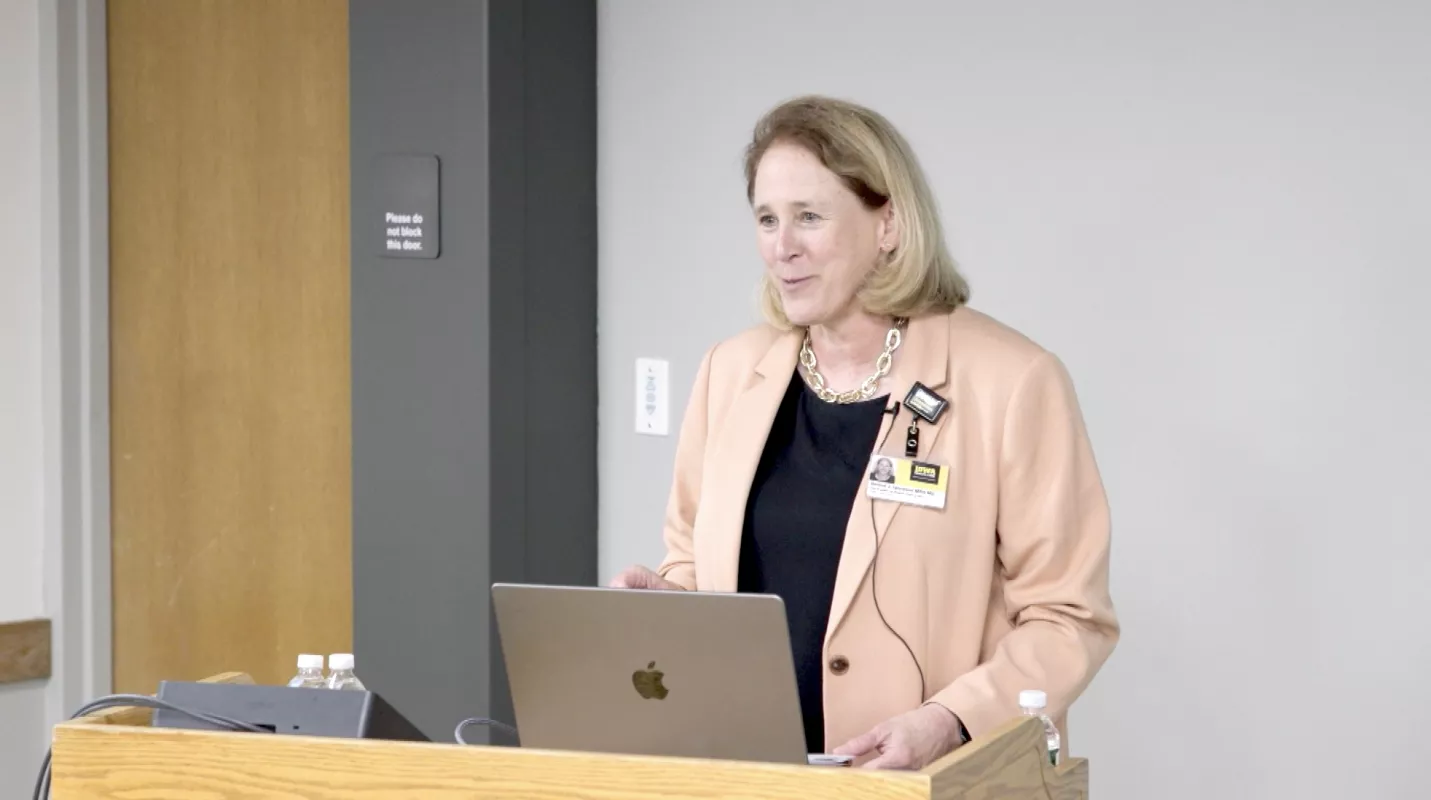Q&A with Denise Jamieson: Our downtown campus 6-month update
Six months ago, University of Iowa Health Care integrated the former Mercy Iowa City hospital—now called UI Health Care’s downtown campus—and associated clinics.

Denise Jamieson, MD, MPH, UI vice president for medical affairs and the Tyrone D. Artz Dean of the Carver College of Medicine, recently participated in an all-employee, six-month update on the downtown campus along with Brad Haws, MBA, chief executive officer of the clinical enterprise of UI Health Care. They shared some of the major achievements since the January integration and provided details on what’s to come.
“Our objectives through this transition have been to preserve local access to care, ensure that our patients continue to have a place to receive outstanding care, and preserve jobs. I believe we’ve held up on these commitments, and it’s been an amazing journey so far,” Jamieson says. “Collectively, we've achieved in just a few months what it takes most health systems to do in years, and all the credit goes to our dedicated teams. I really appreciate your resilience, your dedication to our patients, and your collaboration. And most of all, I really appreciate your spirit of hospitality.”
Can you summarize some of the initial commitments UI Health Care made during this integration and the progress made so far?
Initially, two goals were top-of-mind: We wanted to make sure employees kept their jobs and patients continued to receive care without much interruption. To do this, we offered employment to all employees in good standing, and we were thrilled to welcome most of them to our team. We also kept an open medical staff model to keep many of the talented physicians formerly affiliated with Mercy.
The transition to Epic as our electronic medical record then very quickly rose to the top of the prioritization list, as it is key to optimize operations and direct patients to receive care where it makes the most sense. We officially went live with Epic for our downtown campus on May 4—and I know it’s been a major step in improving communication and patient flow between our two campuses.
We also appointed a chief administrative officer for the downtown campus: Jennifer Miller, MHA, MPH, RD, who has been a trusted leader with UI Health Care for over a decade and most recently served as the support services director. It’s been great to see Jenn’s energy and leadership already making an impact at the downtown campus, and I look forward to seeing the work she’ll do moving forward.
We’re also investing in the infrastructure of the campus. We completed an initial facilities assessment, and there are several repairs underway or planned over the coming months as part of our commitment to invest at least $25 million in infrastructure upgrades. These initial projects include improvements to the roof, the parking structure, and radiology equipment.
This foundational work must be a priority now, and we know that it will take time and more financial investment.
I’m proud of the progress we’ve made in such a short amount of time, and I believe these early priorities will set us up for accelerated progress in the future.
How has the transition affected patient volumes at the downtown campus?
We’ve seen positive movement across volumes in the average midnight census, ED visits, and surgical cases—even with some ups and downs. This is normal and expected.
Our work for the next six months is to see more steady growth so that we can continue to meet the needs of our patients. An overarching part of our longer-term strategy is to increase patient access for Iowans, and I know the downtown campus will be crucial in helping us achieve this.
Now that Epic has been launched, it gives us the opportunity to truly begin looking for ways to maximize capacity across both the university campus and downtown campuses. We want to do things right, and getting it right takes time.
Have any decisions been made on what services will move to the downtown campus?
We’re currently looking into roughly eight initial services and programs that may be fit for relocation to the downtown campus. Brad Haws has assigned operational leads for each area to begin investigating feasibility. We may call upon staff and providers at both campuses to provide more information and insight to aid in the decisions.
These areas are:
- Obstetrics and midwifery
- Family medicine
- Gastrointestinal endoscopy
- Operating room utilization
- Heart and vascular services
- Sleep disorders
- Oncology services
- Custodial care
How are you getting the word out so that our community members know that the downtown campus is open for the long term?
We want our community to rest assured that they can receive the same great, high-quality care they’re accustomed to at our downtown campus. Since we’ve laid out some of the foundational work, we’re now in a great position to start marketing our services at the downtown location. We’ve prepared targeted digital ads, print ads, a billboard, direct patient communications, and social media that will be rolled out in the coming weeks.
We’re also still in the process of converting the signage in front of many of our newest clinics.
Overall, we’re excited to promote our downtown campus under our new, bold UI Health Care brand. We hope our team will help us spread the word that we’re committed to the long-term success of this campus.